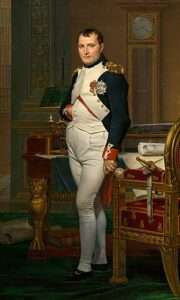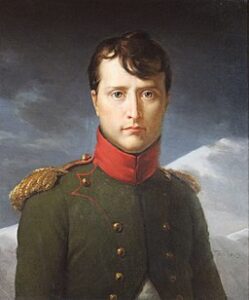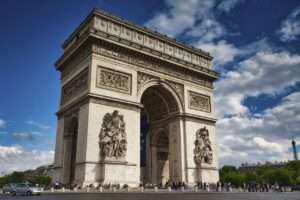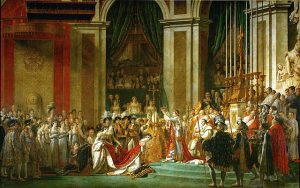Napoleon Private Tour in Paris
Napoleon Private Tour in Paris: Customizable format with walking Tour or driving tour to cover more ground comfortably, visiting key Napoleon sites across Paris with ease. For those fascinated by history, Paris is the city where the shadow of Napoleon Bonaparte linger.
Paris Napoleon History Tour with a Private Guide
Napoleon Bonaparte is one of the most influential figures in world history, leaving behind a complex and multifaceted legacy that continues to resonate across Europe and beyond. His impact extends far beyond his military conquests and political ambitions, shaping modern legal systems, educational reforms, and even the geopolitical landscape.

The Life and Legacy of Napoleon Bonaparte Tour
Napoleon Bonaparte, born in 1769 on the island of Corsica, rose to prominence during the French Revolution. His military genius and political acumen led him to become the Emperor of the French, a title he held from 1804 until 1814, and again briefly in 1815 during the Hundred Days. Napoleon’s ambition was boundless, and his impact on France, particularly Paris, was profound.
Napoleon’s Impact Tour in Paris
His vision for Paris was to transform it into a modern imperial capital. His influence can be seen in Paris city’s architecture, military history, code and reforms legacy.
Military Innovations
Napoleon revolutionized military organization and tactics, emphasizing speed, flexibility, and decisive battles. His methods influenced military strategy in 19th 20th centuries.
The Napoleonic Code, or the Civil Code of 1804
One of Napoleon’s most enduring contributions is the Napoleonic Code, or the Civil Code of 1804. This legal framework abolished feudal privileges and established principles such as equality before the law, religious freedom, and the protection of property rights. The Napoleonic Code influenced many legal systems worldwide and remains the foundation of civil law in France and other countries.
Napoleon’s Educational Reforms: Building a Meritocratic State
Napoleon recognized the importance of education in building a strong state. He established the lyceum system, a network of state-run secondary schools (lycée) aimed at training future military officers and civil servants. These reforms helped promote meritocracy over aristocratic privilege.
Stabilizing France: Napoleon and the Birth of Modern Institutions
Napoleon Bonaparte’s influence included sweeping changes in France’s economic infrastructure. Indeed, he established key institutions that are still central to France’s financial and economic system today. He reorganized the French administrative system, establishing efficient tax collection methods and creating the Bank of France to stabilize the economy.
Napoleon’s Vision for Paris: Order, Modernity, and a Lasting Urban Legacy
It might be a detail, but Napoleon standardized Parisian street numbers, making it easier to navigate the city. His system of even numbers on one side and odd numbers on the other is still in use today. Napoleon had a vision of modernizing Paris, which included constructing roads, bridges, and public buildings to enhance the capital’s grandeur and efficiency.
Napoleon and the Concordat of 1801: Restoring Order Without Restoring Power
By signing a concordat with the Pope in 1801, Napoleon Bonaparte put an end to ten years of crisis following the French Revolution. But he did not restore the Catholic Church to the status it had in France in 1789. The key words of the concordat reconstruction were in fact religious freedom of worship. Read more about Napoleon legacy and life timeline page.
Key Stops on the Napoleon Tour in Paris
Napoleon Bonaparte left an indelible mark on Paris, shaping it into the beautiful and organized city we know today. From grand monuments like the Arc de Triomphe to smaller yet significant reforms like street numbering, his legacy is everywhere. A private walking tour with PARIS BY EMY allows you to uncover these treasures and walk in the footsteps of one of history’s most influential leaders.
A private tour focusing on Napoleon’s life offers a unique opportunity to explore Paris.
- Paris Official licensed guides English Speaking
- Hotel pick up and Drop off at your convenience
- Availability: Offered year-round, with flexible start times.
From €360 – USD $390 up to 6 persons upon level of customization
- 3-Hour Napoleon Private walking tour with stops and Highlights
- Metro and Uber can be used during the walking tour
From €850 – USD $885 up to 6 persons upon level of customization
- Private 4-hour city tour by car with Stops and Highlights
- Customized Napoleon private tour and flexible schedule
The private Napoleon tour can be customized based on your preference for a walking or driving experience
The Louvre Museum and Napoleon
Did you know that the Louvre wasn’t always the massive art museum it is today? While the Louvre started as a royal palace, it was under Napoleon’s reign that it truly began its transformation into a public museum. Napoleon added many artworks, many of which were spoils of war, to the museum’s collection. You can even find a section called the Napoleon Wing, named in his honor. His influence not only expanded the museum but also made it a symbol of French cultural pride. You can ask for a Louvre Museum private tour with a licensed guide expert in Napoleon and the Louvre.
Rue de Rivoli – A Napoleon-Inspired Street
Walking down Rue de Rivoli is like walking through a piece of history. Named after Napoleon’s victory at the Battle of Rivoli in Italy, this street was part of his grand vision for modern Paris. Its elegant arcades and uniform architecture reflect the emperor’s desire for beauty and order in the city. Today, Rue de Rivoli is a bustling thoroughfare lined with shops, but its origins are deeply rooted in Napoleon’s legacy.
Les Invalides Musée de l’Armée – Napoleon’s Tomb Tour
One of the most significant stops on the tour is Les Invalides, where Napoleon’s tomb is located. The grandiose structure and the somber atmosphere make it a poignant place to reflect on Napoleon’s life and legacy. While at Les Invalides, the Musée de l’Armée is a must-visit. It houses an extensive collection of artifacts from Napoleon’s reign, including his uniforms, weapons, and even his horse’s remains. Napoleon’s military campaigns are legendary. His ability to strategize and execute complex maneuvers on the battlefield made him one of the greatest military minds in history. He expanded the French Empire across much of Europe, from Spain to Russia, at its height. However, his aggressive expansionism also led to widespread conflict, culminating in the Napoleonic Wars, which reshaped European borders and political dynamics.
Arc de Triomphe – A Monument to Glory
Commissioned by Napoleon after his victory at Austerlitz, the Arc de Triomphe is a symbol of military prowess and national pride. Climbing to the top provides a panoramic view of Paris, offering a perspective that Napoleon himself might have envisioned.
Place Vendôme – The Napoleon Tour Paris Power Symbol
Napoleon’s column in Place Vendôme, inspired by Trajan’s Column in Rome, stands as a testament to his military victories. The area around Place Vendôme also reflects the opulence and power associated with his reign.
Château de Malmaison – Napoleon’s Residence
Located just outside Paris, the Château de Malmaison was the private residence of Napoleon and his first wife, Joséphine. This charming estate provides insight into his personal life and his more tender side. Indeed, it contrasts with his image as a military leader.
The château’s interiors, preserved as they were during Napoleon’s time, allow visitors to step back in time and witness the daily life of the Emperor. The gardens, designed by Joséphine, are particularly beautiful and reflect her love for botany.
Palais de Fontainebleau – Napoleon’s Imperial Retreat
Another significant site is the Palais de Fontainebleau, where Napoleon signed his first abdication in 1814. This palace, rich in history and art, was one of his favorite residences and reflects the grandeur of his empire.
Paris Through Napoleon’s Eyes
A Napoleon private tour in Paris is not just a journey through the streets of the city but a voyage through time. From grand monuments to intimate residences, every stop on the tour tells a story of power, ambition, and legacy. By the end of the tour, you’ll have a deeper understanding of how Napoleon shaped Paris and France. Napoleon Bonaparte’s legacy is a testament to his extraordinary impact on history. From legal reforms and military strategies to educational systems, his influence is still felt today.
Napoleon Coronation at Notre Dame Cathedral
Napoleon Tour Architectural Contributions in Paris
Under Napoleon’s rule, Paris saw the construction of iconic landmarks, such as the Arc de Triomphe, commissioned to honor the Grande Armée, and the embellishment of the Place Vendôme. His efforts were aimed at glorifying his reign and leaving an indelible mark on the city’s landscape.
Military Campaigns and Their Parisian Connections
Many of Napoleon’s military campaigns, from the Battle of Austerlitz to the campaigns in Egypt, had deep connections to Paris. The city served as the political and logistical hub for his extensive military operations. The relics and memorabilia from these campaigns are still housed in Parisian museums, such as the Musée de l’Armée.
Napoleon Private Tour in Paris
Beyond Napoleon Tour in Paris
Customized full stay Paris itinerary, Paris skip-the-line tickets, Paris museum with certified guide, unique leisure activities to do in Paris booking such as cooking, wine tasting…, Paris private car services within Paris, Normandy, Champagne…, hotel recommendations and gourmets Paris restaurant recommendations with reservation as well. Choose a personalized Paris tour package.
Have a look at PARIS BY EMY private guided tour page.






